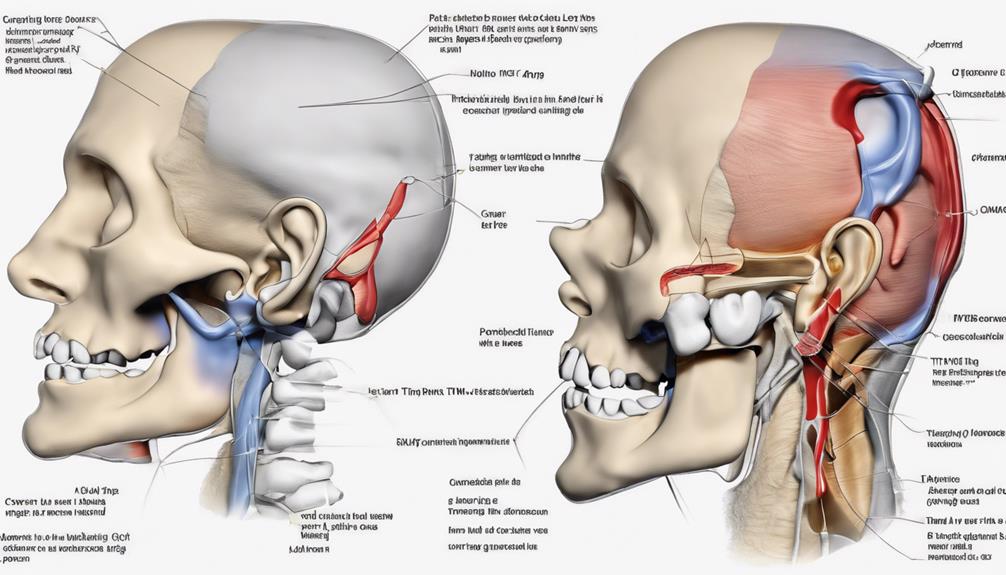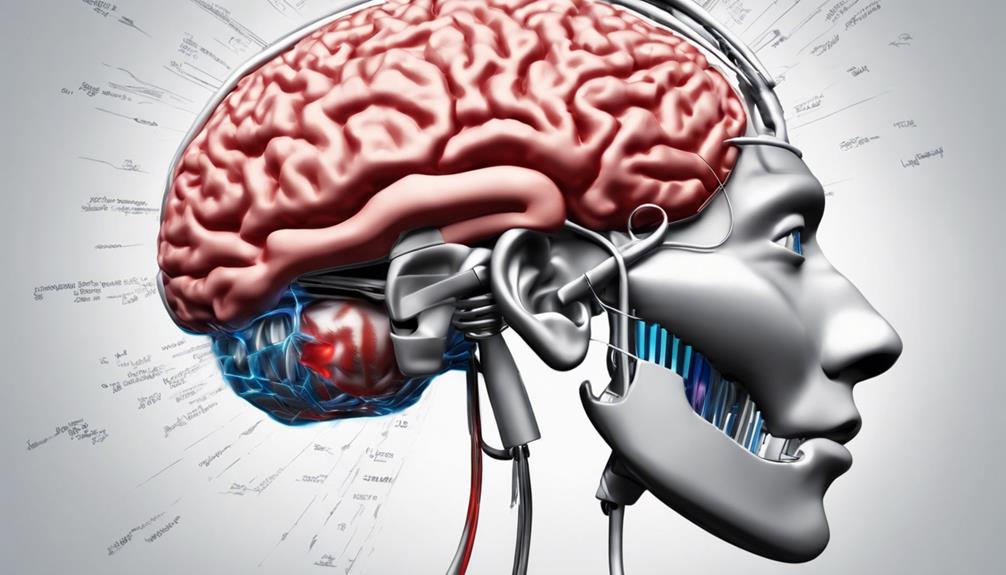Journeying through the intricate labyrinth of antibiotics-induced hearing loss unveils a fascinating web of intricate connections that outline the potential harm to our ability to hear. Explore the intricate web of connections between antibiotics and hearing loss. Join the fascinating journey to uncover how antibiotics can affect our hearing.
Understanding the nuances behind how antibiotics can impact our hearing is like deciphering a complex code – one that holds the key to preserving a vital aspect of our health.
Join us on this journey as we unravel the mysteries surrounding antibiotics and their connection to hearing loss, shedding light on important insights that could safeguard your auditory well-being for years to come.
Key Takeaways
- Aminoglycosides and macrolides damage inner ear cells, leading to hearing loss.
- Awareness of ototoxic antibiotics like gentamicin and azithromycin is crucial.
- Monitoring hearing function during antibiotic treatment is essential for early detection.
- Prompt medical attention for any hearing changes while on antibiotics is necessary for managing potential hearing loss.
Antibiotic-Induced Hearing Loss Mechanisms
In our exploration of antibiotic-induced hearing loss mechanisms, we delve into the intricate pathways through which antibiotics like aminoglycosides and macrolides inflict damage on inner ear sensory hair cells, ultimately leading to sensorineural hearing impairment.
Aminoglycosides, known for their ototoxicity, primarily cause hearing deficits by inducing death in inner ear sensory cells. Research efforts are concentrated on unraveling the molecular events that underlie aminoglycoside-induced hearing loss, with a particular focus on the involvement of reactive oxygen species.
Furthermore, candidate transport pathways that facilitate aminoglycoside entry into sensory cells have been identified and are currently under intense investigation to better comprehend the mechanisms at play. Intriguingly, the intracellular targets of aminoglycosides, notably mitochondrial ribosomes, are also under scrutiny to elucidate their role in sensory cell demise and subsequent hearing loss.
Understanding these intricate processes is crucial for developing strategies to mitigate antibiotic-induced sensorineural hearing impairment effectively.
Types of Antibiotics Linked to Hearing Loss

Among the various classes of antibiotics, those most commonly implicated in causing hearing loss include aminoglycosides like gentamicin, amikacin, and neomycin, as well as macrolides such as azithromycin and clarithromycin. Aminoglycoside antibiotics like kanamycin and paromomycin are also known to contribute to hearing impairment. Additionally, vancomycin, a glycopeptide antibiotic, has been identified as potentially causing hearing loss.
It's essential to be aware of the ototoxic effects of these medications to prevent any potential damage to hearing. Furthermore, certain non-aminoglycoside antibiotics like azithromycin and erythromycin have been associated with ototoxicity, emphasizing the importance of monitoring and managing antibiotic use, particularly in patients with existing hearing issues.
Understanding the specific types of antibiotics linked to hearing loss can aid healthcare professionals in making informed decisions when prescribing medications, ultimately helping to safeguard patients from the risk of drug-induced hearing impairment.
Protecting Your Hearing on Antibiotics
To safeguard your hearing while taking antibiotics, proactive monitoring for any signs of hearing loss is crucial. Here are key strategies for protecting your hearing health:
- Regular Monitoring: Keep a close check on your hearing function throughout the course of antibiotic treatment to detect any changes early.
- Adherence to Prescribed Regimen: Follow the recommended antibiotic regimen precisely as instructed by your healthcare provider to minimize the risk of antibiotic-induced hearing loss.
- Awareness of Ototoxic Antibiotics: Be knowledgeable about the specific antibiotics known to cause ototoxicity, and discuss alternative options with your healthcare provider if needed.
- Early Intervention: Seek immediate medical attention if you notice any alterations in your hearing while on antibiotics, as early intervention can prevent further damage.
Recognizing Hearing Changes on Medication

Monitoring for changes in hearing function while on medication involves recognizing subtle signs such as ringing in the ears (tinnitus), speech comprehension difficulties, and altered sound perception. These symptoms can indicate potential medication-induced hearing issues.
Additionally, paying attention to changes in balance, experiencing vertigo, or feeling dizzy can also signal underlying problems with hearing. Sensitivity to loud noises, struggles to follow conversations in noisy settings, or a sensation of fullness in the ears are other warning signs to monitor.
If there's a sudden hearing loss or a decrease in hearing acuity while taking medication, seeking prompt medical attention is crucial. Regularly assessing your hearing function and promptly communicating any changes to your healthcare provider can aid in the early detection and management of medication-induced hearing loss.
Stay vigilant and proactive in monitoring your hearing health while on medication to ensure timely intervention if needed.
Reversibility of Medication-Induced Hearing Loss
Reversible hearing loss from certain medications hinges on the type and severity of the damage incurred. When it comes to medication-induced hearing loss, especially from antibiotics or loop diuretics, the extent of ototoxicity plays a crucial role in determining the potential for reversibility.
To help you better understand this topic, here are some key points to consider:
- Medication-induced hearing loss can be reversible in some cases, especially when promptly identified and addressed.
- Reversibility of hearing loss from certain medications is more likely compared to irreversible cases, highlighting the importance of early intervention.
- Monitoring changes in hearing function is essential to track the progress and determine the effectiveness of treatment.
- Specific treatments or adjustments to medication regimens may be necessary to improve hearing function and maximize the chances of recovery.
Frequently Asked Questions
How Do Antibiotics Cause Hearing Loss?
We know antibiotics can cause hearing loss by damaging inner ear cells. The primary reason for this is the death of sensory hair cells.
Researchers are delving into the molecular events, like reactive oxygen species' role, leading to cell death from these antibiotics.
Understanding the pathways these drugs take to enter cells and their intracellular targets, such as mitochondrial ribosomes, is vital in comprehending their impact on sensory cells' demise.
What Are Five Common Medications That Are Potentially Ototoxic and May Cause Hearing Loss?
We must highlight the potential risk of hearing loss associated with various antibiotics. Macrolide antibiotics like azithromycin, erythromycin, and clarithromycin, along with aminoglycosides such as gentamicin and tobramycin, are common culprits.
Even vancomycin, a widely used antibiotic, has been linked to hearing impairment. Careful antibiotic selection and monitoring can reduce the likelihood of antibiotic-induced hearing loss.
It's crucial to be aware of these risks when considering antibiotic treatments.
Which Antibiotic Drug Class Could Cause Hearing Loss and Reduced Kidney Function?
Aminoglycoside antibiotics, like gentamicin, tobramycin, and amikacin, can cause hearing loss and reduced kidney function. Prolonged or high-dose use increases the risk. Monitoring kidney function is crucial during treatment to avoid potential damage.
Regular hearing and kidney assessments are necessary for patients on aminoglycosides to detect any adverse effects promptly. It's important to be vigilant about these risks when using aminoglycoside antibiotics.
Which of the Following Antibiotic Is Associated With Ototoxicity and Hearing Loss?
Certain antibiotics like aminoglycosides and non-aminoglycosides, including gentamicin, neomycin, amikacin, azithromycin, and erythromycin, are tied to ototoxicity and hearing loss. Capreomycin has also been linked to significant hearing issues. Monitoring for auditory symptoms during treatment is crucial.
It's important to be aware of the potential hearing risks associated with these antibiotics when undergoing treatment.
Conclusion
In conclusion, while antibiotics are essential for fighting infections, it's ironic that they can also cause hearing loss. By understanding the mechanisms and types of antibiotics that can affect our hearing, we can take proactive steps to protect our auditory health.
Remember to listen closely to any changes in your hearing while on medication, as early detection can make a significant difference in the reversibility of medication-induced hearing loss.
Stay informed, stay vigilant, and protect your hearing.










